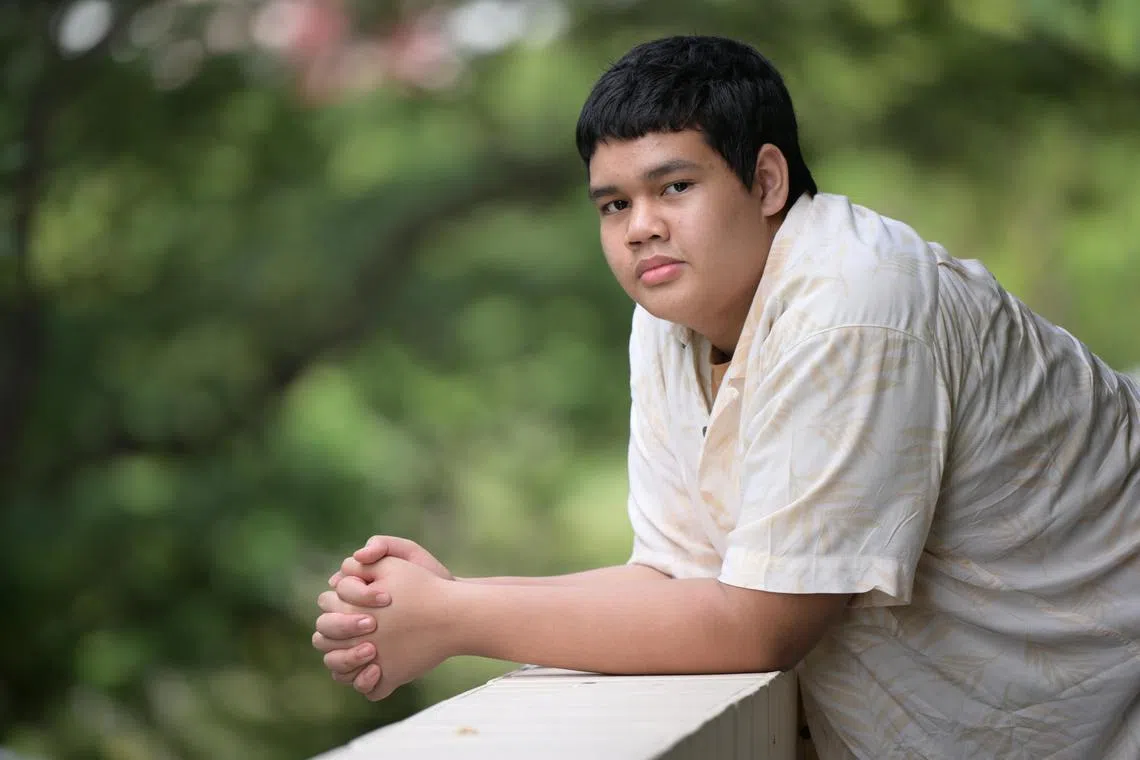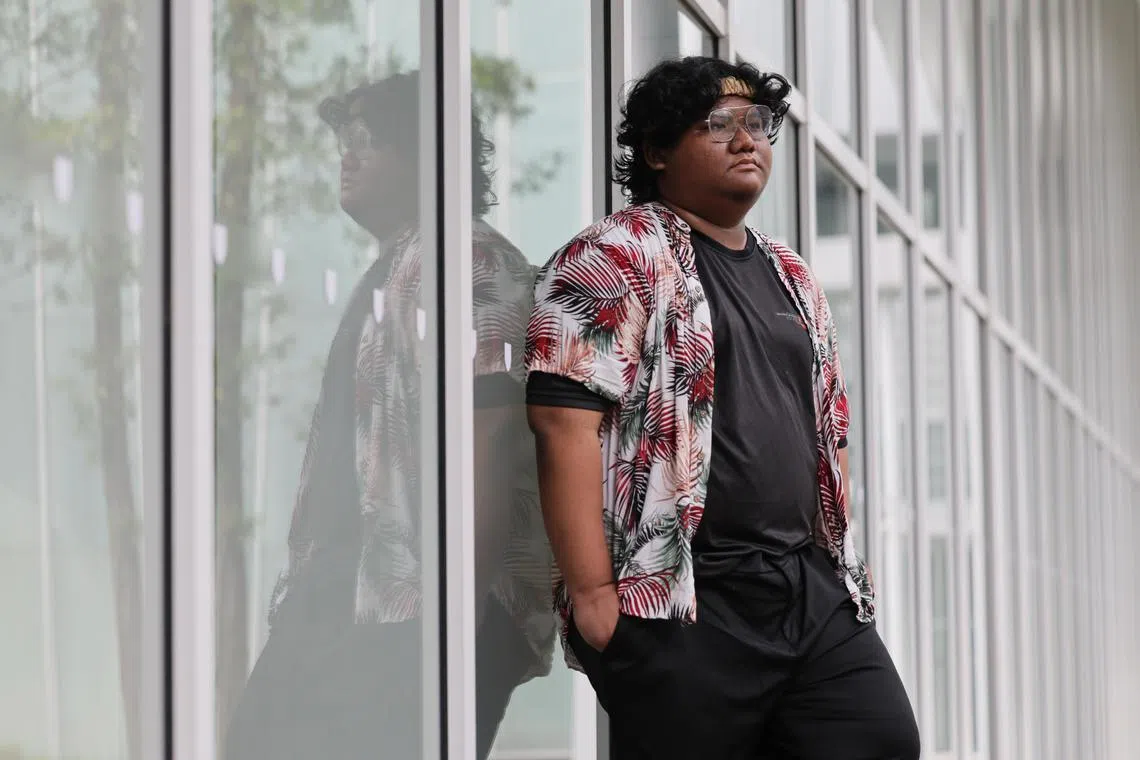No health without mental health
Escaping life through a screen: 2 boys share their struggles with digital addictions
Sign up now: Get ST's newsletters delivered to your inbox

Mohamed Zinedine Emad, 14, found himself neglecting his studies as his screen time increased.
ST PHOTO: NG SOR LUAN
SINGAPORE - Mohamed Zinedine Emad started making friends in virtual reality at the young age of 11.
After getting his first phone in Primary 4, he was excited at the thought of constantly staying in touch with people online through apps like Discord. Faceless people on the app soon turned into friends he would text-chat with daily.
These friends would invite him to join them in playing online games.
Zinedine said: “I figured it was no harm to try, so I just joined them. I didn’t think it would actually get me more hooked on the device.”
His daily screen time went from four to five hours in Primary 4, to between nine and 10 hours when he was in Primary 5 and 6.
As his screen time increased, he found himself neglecting his studies, no longer having time for them.
Before his screen addiction, he would consistently score between 60 and 80 marks per subject. After getting sucked into the virtual world, he barely passed. He also had to drop higher mother tongue in Primary 5 as his poor grades disqualified him from the subject.
In Primary 6, his PSLE year, his addiction got worse.
There were times when he would be on social media or online games for two days straight and avoid contact with his family. His parents are working professionals, and he has two siblings.
“I started avoiding my family just to play games and talk to my friends. I was getting more hooked every single day,” he said.
“My family noticed, of course, and they tried to talk to me. I felt that maybe they were just overreacting like usual. I knew I had a bit of a problem but I thought it was something I could still manage well.”
Zinedine would go to bed at 2am on most nights, and wake up at 6am for school. Before his addiction, he would go to bed by 9pm or 10pm.
The addiction also affected his mood. “The only times I would get angry were when my phone got taken away by my parents,” he said.
“I was worried about my grades ahead of PSLE, but I kept telling myself I had it under control,” said Zinedine, now 14.
He made it to Secondary 1, but still did not learn his lesson until he nearly had to repeat the year.
On the last day of the school year, all his classmates got their report books from the teacher, except for him. His form teacher told him to go to school the next day.
“I was the only student in school the next day as the holidays had started. I walked into a room and saw my form teacher and vice-principal, who told me that I was going to be retained.”
He had received a U grade (ungraded) for all his subjects, and could not be promoted to Secondary 2.
“I felt shocked. I was at a loss for words because all this time I thought my addiction was under control and that it would not affect my life that much.”
But the school gave him a chance to take another exam and allowed him to move on to Secondary 2.
Teachers referred him to Touch Community Services, to attend DigitalMindset, an intervention programme to help young people aged 12 to 21 to regulate their emotions resulting from excessive cyber gaming and use of technological devices.
Through counselling in the programme, he became aware of the negative impact excessive gaming and digital use had on his studies and relationship with his parents and was keen to make changes.
His case worker from DigitalMindset also worked with his parents, providing them with effective parenting strategies and tools to support their son’s journey.
It was hard for him to break the habit at first.
“The first week of trying to put down my devices was quite hard. Getting rid of something you are so used to is not easy,” Zinedine said.
From 10 hours of phone use a day, he now has a screen time of about two to three hours. He rekindled his relationship with his parents, and now speaks to them daily when they come home.
“Now, I just want to get good grades and get a good job in the future – make my parents happy.”
Turning to online games to avoid reality

Art Ng, a student, would spend around six hours a day solely on playing mobile games.
ST PHOTO: GIN TAY
At age 12, Art Ng developed a gaming addiction. When he was posted to a new class with students he did not know in Primary 6, he felt hesitant to step out of his comfort zone and make new friends.
Instead, he started gaming on his mobile phone.
“When I started gaming, it became harder for me to stop and make friends in person. My thoughts were quite self-deprecating. I felt like I was just a loser who played games in the corner of the classroom. It just felt easier to play games than to talk to people in class,” said Art, who is now 17.
He would spend around six hours a day solely on playing mobile games.
Before long, his grades dropped – from As and Bs, to Cs and Ds, and even an F in his PSLE preliminary exam.
“I was really angry with myself for letting it get to that point,” he said.
His gaming habit also affected his relationship with his family.
“I didn’t pay attention to any of my three younger siblings, parents, or friends because I was willing to spend time only on the games I played,” he said.
Most of the time, he was in his room. His parents did not notice anything amiss at first as they thought he was studying. They got worried after they saw his preliminary exam results. They tried to take him out of the house more, hoping it would help him get over the addiction.
Things got worse in 2020, when he entered Secondary 1. The Covid-19 pandemic hit, and quarantine posed an optimal environment for his addiction to fester.
He also struggled with depressive moods and thoughts at the time, leading him to turn to gaming as an escape.
“I met a lot of people through a new game, and it helped me feel like I was overcoming my loneliness because of how much time I spent in the virtual world of gaming,” he said.
The hours he spent gaming increased from six hours to 13, 14 hours a day.
“As soon as I woke up, I played games, and before I fell asleep, I thought about games. It got to the point where I didn’t turn off my laptop for two weeks straight, so that I could start playing as soon as I woke up. It got really bad.”

The games he played affected his mental health as well.
“The games I played were highly competitive, and I essentially became a sore loser. Every time I lost, it would hurt me mentally.”
After the circuit breaker ended and Art went back to in-person classes, he found himself “twitching almost” – so badly did he crave gaming.
“I’d be really fidgety because I really wanted to move my fingers, I really wanted to play games. During those few weeks, I was definitely a lot more irritable too,” he said.
When he confided this to some new friends he made in school, they urged him to seek help.
“One of my friends told me this wasn’t normal, and that I had to talk to someone about it.”
After some other mental health struggles, including a suicide attempt, he sought help from social service agency Impart in 2023.
The agency helped him come to terms with his addiction, and taught him how to bounce back through therapy sessions.
Now a digital design and development student in polytechnic, Art volunteers his time at Impart to help other young people with the same problem he experienced.
“Having gone through the programmes myself, I realised that I’m not the only one who is struggling with an addiction. There are a lot of youth who turn to addiction because of certain things that happen in their lives, and I think that because of how far I’ve come and my own experiences, I have something to offer them. I want to help them.”
Five signs your child may be addicted to screens
Counsellors and social workers said parents can look out for:
Negative mood changes such as irritability, anger, restlessness or sadness when their devices are taken away.
Lying about what they are doing on their devices.
Neglect of self-care, including not eating and sleeping properly, due to device use.
Reduced interest and participation in other activities and hobbies they used to enjoy, like sports or crafts.
Declining performance in school, and feedback from teachers that they have trouble concentrating in class.
Helplines
Mental well-being
Institute of Mental Health’s Mental Health Helpline: 6389-2222 (24 hours)
Samaritans of Singapore: 1-767 (24 hours) / 9151-1767 (24-hour CareText via WhatsApp)
Singapore Association for Mental Health: 1800-283-7019
Silver Ribbon Singapore: 6386-1928
Tinkle Friend: 1800-274-4788
Chat, Centre of Excellence for Youth Mental Health: 6493-6500/1
Women’s Helpline (Aware): 1800-777-5555 (weekdays, 10am to 6pm)
Counselling
Touchline (Counselling): 1800-377-2252
Touch Care Line (for caregivers): 6804-6555
Care Corner Counselling Centre: 6353-1180
Counselling and Care Centre: 6536-6366
We Care Community Services: 3165-8017
Online resources
carey.carecorner.org.sg
(for those aged 13 to 25)limitless.sg/talk
(for those aged 12 to 25)



